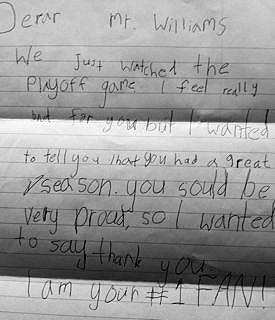In the Systems & Power Leadership Community I facilitate yearly, one of the dynamics we explore relates to anxiety in groups and emotional systems and one of the things that we explore is scapegoating. Last weekend, we had an epic NFL championship Sunday in which two games came down to the wire and ended amidst dramatic circumstances. They had something in common: they both featured horrible mistakes that led to a couple players becoming scapegoats for the loss.
In the aftermath of the 49ers v. Giants game, the scapegoat Kyle Williams even received death threats towards himself and his family. A game suddenly is no longer a game and toxic anger takes over on a wide level.
The question our leadership community has been tossing around these last couple of weeks has been, “What is needed to stem the tide of anxiety when scapegoating is set in motion – in a family, in a team, or in any emotional system?”
Then a friend tweeted this article out and I was struck by it’s relevance to these discussions and it was a powerful example of how a father stemmed the tide of scapegoating in his own family and then how his 7 year old son has begun to stem the tide of scapegoating in the larger sports world.
 Here’s the article here: http://sports.yahoo.com/blogs/nfl-shutdown-corner/awwww-read-seven-old-heart-melting-letter-kyle-214810120.html
Here’s the article here: http://sports.yahoo.com/blogs/nfl-shutdown-corner/awwww-read-seven-old-heart-melting-letter-kyle-214810120.html
Observations about diffusing anxiety in systems that starts to get over-focused on an individual that are reinforced in this example:
- There’s a needed capacity to be sad, to grieve, to let go after dealing with hurt and loss honestly
- There’s a needed capacity to be able to think about, empathize with, and move towards others even while we are hurt or angry ourselves
- There’s a needed capacity to ask questions to those who are wrapped up in anxiety to the point where they are lost and help them refocus or reframe all of the emotion and anxiety they are feeling
- There’s a need to maintain a larger perspective as best as we can
Those are just a few of the things that diffuse scapegoating systems – that help guard against toxic anxiety coping and pain relief and that can free us up to function in loving and peacemaking types of ways.
Don’t be a party to scapegoating and don’t let others become scapegoated. Make this a key part of your leadership convictions and be a part of redemptive and forgiving community. Let’s guard our own hearts and help guard others from unjust blame and judgment.
What other observations might you have about what it takes to stem the tide of scapegoating?
**Addendum – Since posting this, I’ve heard a couple different interviews in which Kyle Williams did. I think this was a smart decision on his part and he came off really well. By staying silent or being defensive he feeds into the dynamic. But facing the music, he infused the discussion with a reminder of his (and all of our) humanity. It’s harder to treat someone like dirt when they are humbly and courageously owning up to their mistakes.
